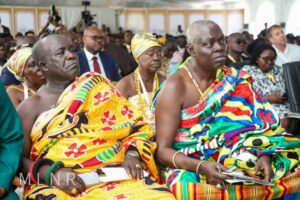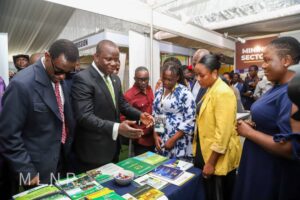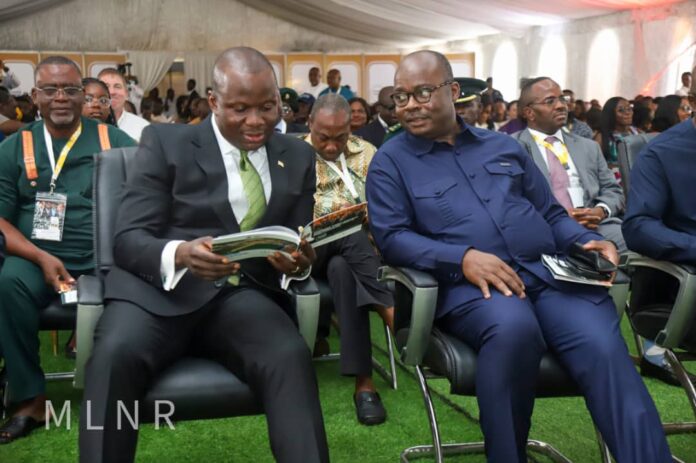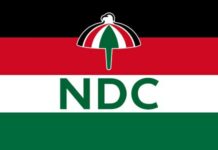The Minister for Lands and Natural Resources (MLNR), John Abu Jinapor, has told the 2023 Gold Expo programme in Takoradi that despite the contribution of gold to our national economy, Ghana had not benefited optimally from our mineral resources.
 This, he observed, was largely due to over-reliance on the export of minerals in their raw state, absence of linkages with other sectors of the economy, lack of domestic capacity, inadequate monitoring mechanisms, and irresponsible mining practices.
This, he observed, was largely due to over-reliance on the export of minerals in their raw state, absence of linkages with other sectors of the economy, lack of domestic capacity, inadequate monitoring mechanisms, and irresponsible mining practices.
In view of this, he said, the policy of the government for the development of the mining industry has been anchored on three main pillars, with the overarching goal of unleashing prosperity for our people.
First among the policy was diversification of our mineral resource base to exploit other lesser known minerals, including the critical minerals required for the green energy transition.
The second one was beneficiation and value addition to minerals mined in our country, to ensure a mutually beneficial situation for both the government and investors.
According to him, it was trite learning that the real value of these minerals lay in value addition. For example, the difference between the prices of bauxite and aluminium ingot, which was produced from bauxite, was over three thousand percent (3,000%).
 “For this reason, if we were to benefit from these minerals, then we must invest in value addition. That is why since 2017, under [the] leadership of President Akufo-Addo, we continue to pursue policies aimed at adding value to our mineral resources.”
“For this reason, if we were to benefit from these minerals, then we must invest in value addition. That is why since 2017, under [the] leadership of President Akufo-Addo, we continue to pursue policies aimed at adding value to our mineral resources.”
Minister Jinapor announced that, the government, through a Public Private Partnership, established a Gold Refinery, and “we are working to secure a London Bullion Market Association (LBMA) Certification to enable us easily trade gold refined in our country on the international market.
“As you know, we have established the Ghana Integrated Aluminium Development Corporation (GIADEC), and the Ghana Integrated Iron and Steel Development Corporation (GIISDEC), to promote and develop integrated aluminium and iron and steel industries in the country.”
He explained that with an estimated bauxite resource base of nine hundred million metric tonnes (900,000,000mt), developing an integrated aluminium industry was sine qua non for the substantial growth of our national economy, thereby enabling us to create the thousands of jobs needed to unleash prosperity for the mass of our citizens.
“We are, therefore, working with all stakeholders to ensure that in the not-too-distant future, we do not export bauxite and iron ore in their raw state,” he said.
And for our green minerals, including lithium, the Sector Minister further announced that Cabinet was currently considering, a policy proposal for the exploitation, management and utilisation of these minerals.
“Our goal is to ensure that, as much as possible, we retain a significant proportion of the value chain of these future and other critical minerals in our country”.
The third policy the government was pursuing was local content and local participation. “We pursue this policy with the overarching objective of ensuring that Ghanaians, who are, by the teaching of our national Constitution, the owners of our mineral resources, benefit from the mining industry.”

Minister Jinapor told the guests at the 3-day Ghana Expo programme that all these policies were implemented in a manner, which was acutely conscious of the interest of investors; “for we recognise that investors are our natural partners, with whom we work towards a common goal, that is, the intelligent, sustainable and effective exploitation of our mineral resources for our collective benefit”.
Minister Jinapor mentioned that as government continued to implement policies and programmes for sustainable mineral resource development and the well-being of mining communities, government would need the support of all stakeholders.
“We need to work together to strike the right synergies, source for the requisite expertise, develop the relevant innovations, and build the right partnerships to achieve the needed growth and transformation we desire.
 “We must remember that it is our collective duty to leverage sustainable mineral resource development for optimal socio-economic growth and development. Government has an obligation to develop mining communities, but I dare say, all of us, particularly, operators in the mining industry, have an obligation too. We shirk this responsibility at our own peril. We owe this duty, not only to current generation, but also to generations yet unborn.”
“We must remember that it is our collective duty to leverage sustainable mineral resource development for optimal socio-economic growth and development. Government has an obligation to develop mining communities, but I dare say, all of us, particularly, operators in the mining industry, have an obligation too. We shirk this responsibility at our own peril. We owe this duty, not only to current generation, but also to generations yet unborn.”
The Western Regional Minister, Kwabena Okyere Darko Mensah, whose idea gave birth to the Gold Expo programme four years ago, said the mining sector would drive economic growth, create employment opportunities, and contribute to our nation’s development.









